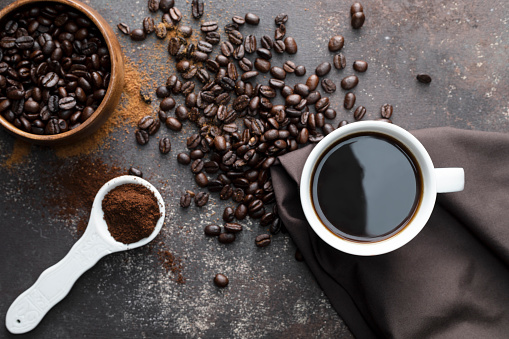Honey and Coffee Better than Steroids for Persistent Cough?


by Dr. Valerie Donaldson via Regenerative Medicine Center
An interesting and well-done research article published in 2013 was brought to my attention entitled “Honey plus Coffee vs Systemic Steroid in the treatment of persistent post-infectious cough (PPC): a randomized controlled trial”. The study was done at Baquyatallah University Hospital Tehran, Iran, and published in the Primary Care Respiratory Journal.
One of the annoying aftermaths of Covid or any respiratory infection, including the common cold, can be persistent cough. PPC accounts for 11-25% of all chronic cough complaints.
Cause of Persistent Post-Infectious Cough (PPC)
As no viral etiology is usually found to be the cause, the cause of persistent cough is thought to be due to a hypersensitivity of sensory nerve receptors in the throat and lungs leading to a hypersensitivity of the cough complex. Because of increased sensitivity the patient becomes more sensitive to cigarette smoke, chemical fumes, aerosol sprays, dust, perfumes, drinking, eating, talking, laughing, and breathing cold air. Currently available treatments are antihistamines, narcotics, steroids, numbing agents such as Tessalon Perles (benzonatate), and bronchodilators inhaled or taken orally. Studies have been done on Honey alone and Caffeine alone for cough, but none have been done combining the two.
Honey Soothes the Throat
Honey has been used medicinally since 3000 BC!. Even the WHO has cited honey as a possible treatment for cough. Honey is known to soothe the throat. It contains over 200 substances that increase antioxidants, cytokine release to decrease disease, and also is a natural antimicrobial. Honey has also been used in burns, injuries, and wounds as it decreases inflammation and helps with tissue regeneration. Honey has been used for gingivitis and periodontal disorders because of its antimicrobial action as well as its ability to cause saliva secretion. It also increases mucous secretion in the airways helping to loosen and move out phlegm.
Caffeine
Caffeine has been a controversial drink in the past. One year you are told it is good for you and one year you are told it is bad. The bottom line is caffeine is a ‘drug’ because it stimulates the central nervous system. Two to three cups a day has been found to be beneficial but drinking a pot a day can be detrimental. Caffeine acts as a bronchodilator. It also works as a hypoalgesic decreasing sensitivity and is anti-inflammatory. Depending on a person’s detoxification system caffeine can cause insomnia or have no effect at all on sleeping. Caffeine is used often in medication preparations to increase absorption of the medication.
RMC Trial of Honey and Coffee
Often none of the currently available treatments can turn this annoying chronic cough around. Some of my patients with PPC from Covid volunteered to try it. These were patients that had previously been treated unsuccessfully with Tessalon Perles and other over the counter preparations. So far, in RMC’s small study of 4 patients the concoction when made correctly has worked 100%. Tea was substituted for coffee and worked also.
Iran’s Study
The study consisted of 97 participants divided into 3 groups all of whom had persistent cough for more than 3 weeks. The participants were instructed to dissolve one rounded tablespoon of the below pastes in 7 oz of warm water and drink the beverage every 8 hours for one week.
Before and after drinking their beverage, a mean cough frequency was calculated by visual analogue cough questionnaire score.
Pastes were made by mixing the following combinations.
- Honey-coffee group: Native Honey, 1 ½ cups plus 7 rounded tablespoons of original instant coffee by Nestle
- If mixing one cup at a time, Each cup = 1 heaping tablespoon of honey + 1 level teaspoon of instant coffee in 7 oz of water.
- Steroid group: 320 mg of prednisolone
- Each dose =13.3 mg or 39.9 mg a day
- Guaifenesin a cough suppressant sold over the counter was used as the Control Group because the researchers did not want to deprive the participants of medical treatment.
- Each dose=25 mg or 75 mg a day
Iran Study Results
The honey-coffee combination was a statistically effective form of treatment and had a significantly more curative effect on cough than the other two regimes. Before treatment, all three groups maintained similar cough frequency via the questionnaire score: honey coffee group mean score 2.9, steroid group mean score 3.0, and control group mean score 2.8.
Following treatment, the honey-coffee group outperformed the two other regimens and demonstrated the greatest and most significant decrease in cough questionnaire score with an impressive drop from 2.9 to 0.2.
The steroid group, though significant, only decreased from 3.0 to 2.4.
The control group had no significant change with a mean score of 2.8 to 2.7.
Conclusion
In conclusion, this study demonstrated the superior therapeutic effect of honey and coffee for the treatment of persistent post-infectious cough and exemplifies the potential medicinal effects of natural substances. Honey and coffee are easily accessible, safe, less expensive than medicines and lastly, a tasty duo that has been shown to be a highly effective treatment modality for a significant percentage of individuals suffering from the annoyance of PPC.
Have an awesome day! Dr D.
https://www.nature.com/articles/pcrj201372
Reprinted with permission from Regenerative Medicine Center.